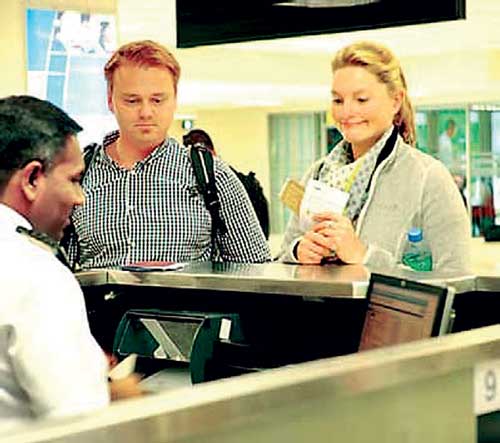Sunday Feb 22, 2026
Sunday Feb 22, 2026
Tuesday, 9 August 2022 03:48 - - {{hitsCtrl.values.hits}}
By Charumini de Silva
Sri Lanka’s plans to introduce a long-term digital nomad visa for foreign professionals have been delayed with former President Gotabaya Rajapaksa in his capacity as the Technology Minister failing to sign the relevant Cabinet paper agreed by all connected authorities to put the system in order.
The Daily FT learns that the Immigration and Emigration Department has received around 40 applications, but it cannot proceed with the visa issuance as the former Technology Minister Rajapaksa had not authorised the proposal which was ready in February, thus it never got passed to the Cabinet.
In July 2021, the Cabinet of Ministers cleared a proposal to offer visas for foreign visitors looking to work remotely and stay in Sri Lanka for long periods. The move came in the wake of the country being ranked second-best for Digital Nomads in 2021 by the influential French travel and tourism operator – Club Med.
The implementation of the Digital Nomad Visa was originally assigned to Sri Lanka Tourism and the Immigration and Emigration Department, but later the Information Communication Technology Agency (ICTA) too was roped in.
Following a feasibility study, Sri Lanka Tourism had originally proposed that the visa fee be $ 500 up to one year and $ 50 for each month extended. However, as per the new Cabinet paper, the authorities have recognised that the families who come with Digital Nomad visa holders must be considered and thus have decided to issue them with a one-year Residential Visa at $ 100.
“There was a lot of opposition to this new visa system as professionals feared foreigners will get into the local job market. Thereafter, ICTA was brought in to scrutinise the background of the applicants. As per the last amended Cabinet proposal, the first-year visa fee was $ 300.”
“However, if the same foreigner wants to extend the visa for another year, it will be $ 300. However, if it is a new visitor applying for the same visa, the fee will be $ 600,” Sri Lanka Tourism Development Authority (SLTDA) Director-General Dhammika Wijayasingha told the Daily FT.
It was also pointed out that under the new system, it would be easy to monitor the prime visa holder and their families.
Fast forward a year, the Daily FT learns that the Government is yet to get Cabinet approval and issue Digital Nomad Visa to boost the inflow of foreign exchange to the economy, despite its dire need for foreign currency to overcome the worst economic crisis.
“We have not issued any visas under the digital nomad scheme. However, we have received around 30 to 40 applications for digital nomad visas,” Immigration and Emigration Department Deputy Commissioner General Piyumi Bandara told the Daily FT. She also said that the system to implement visas from the Department was all set.
Industry experts claimed that the inability to take quick decisions by bureaucrats has caused a massive loss of foreign exchange for the economy, as the implementation of the project was delayed for a year even after obtaining the first Cabinet approval in July 2021.
The Tourism Ministry submitted a fresh Cabinet proposal in October last year, which sought to cover and clarify all aspects of the move aimed at catering to a growing segment of tourists who travel around the world and work online.
Although the exact definition of ‘digital nomad’ varies from place to place, the general principle is that they are either self-employed or employed by a company based in one country, while working remotely in another country.
The practice gained significant appeal in light of the COVID pandemic when many professionals were forced away from their offices and had to work at home, fuelling the realisation that they could, in fact, work from anywhere in the world.
In March, Sri Lanka was ranked as the second most preferred destination in the Asia Pacific region for remote work, according to the Work from Wherever Index from Kayak. Sri Lanka was ranked second to Japan and outran countries such as Thailand, Indonesia and Singapore, the newly-launched index revealed. In a global context, Sri Lanka secured the 13th position, among 111 countries analysed by Kayak.
Sri Lanka bagged an overall score of 80 out of 100. From a total of 100 points, the country was given 80/100 for travel, 94/100 for local prices, 47/100 for health and safety, 41/100 for remote work, 25/100 for social life and 81/100 for the weather.
“Sri Lanka has very attractive local prices and affordable long-term apartment rentals, which create great travel opportunities. Digital nomads will appreciate the good weather conditions all year round,” said the world’s leading travel search engine Kayak, in a statement that released the final rankings under the index.